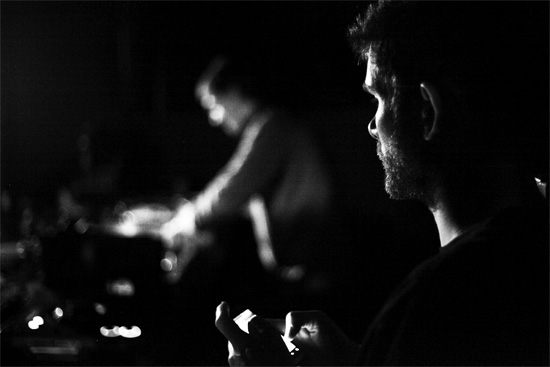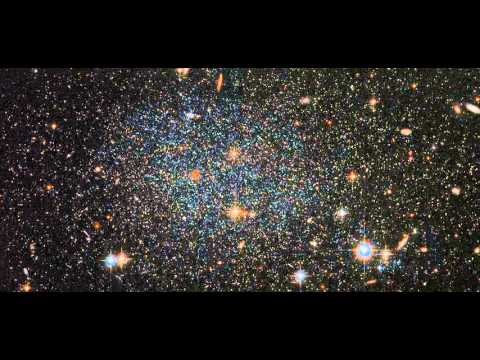Photo by Theo Cottle
Even by the standards of Hessle Audio, the label who have put out the majority of his work to date, Elgato’s music could be seen as something of a hard sell. The producer’s discography is about as short as they come: a mere three singles since his 2010 debut, plus a track on Hessle’s 116 & Rising compilation. But collectively they outline an aesthetic that’s both exceptionally bold and instantly recognisable. At a time when lo-fi is in vogue, Elgato’s productions are clean and crisp almost to a fault. And at a time when much of the dance underground is leaning towards maximalism of various forms, Elgato opts for extreme, provocative minimalism, allowing his pristine loops to roll forth into hypnotic infinity. It’s an approach that, as the producer explains when we meet one grim April evening, owes more to his past infatuation with the minimal house and techno of labels like Cadenza and Perlon than it does to the garage and house that tends to populate his sets.
There are ties between the two, though. Elgato’s debut, ‘Tonight’ / ‘Blue’, felt like an extreme outside perspective on UK funky, all whipcrack snares and wailing sirens. ‘Luv Zombie’, taken from its 2012 follow-up, displayed a subtle but irresistible garage flex. And his latest, and his first single to appear on a new self-titled imprint, cleaves closer than ever to deep house, leavening the producer’s druggier tendencies with a quietly seductive warmth. These are tracks born not of stylistic tunnel vision but of an omnivorous passion for dance music; a passion whose origins were seeded during the producer’s formative years, while at university in Bristol in the mid-2000s. Elgato, it’s fair to say, caught the dubstep bug as badly as anyone. But the clubnight he co-founded with friends, Bruk, took a different tack; one that took the emphasis off named headliners and threw the music policy wide open, foreshadowing the approach increasingly taken by many young promoters in the last couple of years.
Speaking to Elgato it’s clear that, however forbidding his music may seem, he holds a deep respect for the clubbing experience as a social phenomenon, and for the DJ’s role as facilitator rather than dictator. It’s a curious balancing act: a singularly uncompromising production career on the one hand, an embrace of the artful compromise of DJing on the other. But it’s one that Elgato achieves with rare grace.
Let’s start by talking about your musical background. Were you into dance music from an early age?
Elgato: Not from an early age. In my teens I was quite into hip-hop, I used to DJ that. And before that I was into all sorts of different stuff, but not really dance music. At uni I got to be friends with a lot of people from London, and they were all big garage heads.
Whereabouts did you study?
E: Bristol. So I got exposed to garage through them. To start with it was pretty alien really, it took me a little while. But in terms of house and techno, one of the points when it started to fall into place for me was when I was given a Fela Kuti album, Shakara / London Scene. Before that I’d always been into funk and soul from the kind of stuff that my dad listened to. So it was a much more familiar sound palette, but it really opened me up to what repetition can do in music. Essentially tracky-ness, for want of a better word, rather than a song-based approach. I loved that album and listened to it a lot, and looking back, I think that really shifted my perspective.
When was it that you were getting to know these guys who were into garage – was it at the time that garage was big?
E: No it was after, about 2003. There was still dark garage around, and grime was starting to take off. But in terms of classic garage, that was sort of a thing of the past.
Were you in still Bristol at the point when dubstep started cropping up?
E: Yeah, I was there until 2006. In about 2004 some of my mates came back from London and were telling me about FWD>>. Then a big crew of us went down to one of the first Subloaded events in Bristol. Plasticman was playing, Pinch, maybe Kode9. That was my first exposure to that side of things. It was quite a turning point. So I was there through the early phases of that sound coming to Bristol. I went to see Loefah and Skream in this little place, The Croft, and there was probably about 25 people there. It was so weird, the music – like nothing we’d heard before. Then we started going all over the place to see it, coming to London to go to FWD>> and DMZ.
When did you start the Bruk nights?
E: I think it was 2005. Quite a few of us were DJs and we wanted to put something on where we could get loads of our friends into a club and play the music we liked – that was at the heart of it. We did it in a few different venues, but I think it found its thing when we moved to Take 5 [Cafe, venue on Bristol’s Stokes Croft], ‘cos it was such a different kind of space. We did it there quite a few times from 2005/06 through to about 2009 or 2010. But quite irregularly, just every now and again.
I gather you didn’t announce line-ups beforehand. Could you describe the ethos behind the nights?
E: I suppose it was to do with preconceptions, and what information can do to the experience of music and of going out to nightclubs. If you see a poster with all the names of the DJs on it, you walk in with fixed ideas, expecting a certain thing. And that frames the way that you experience the night. We wanted to do something where people would come in with no real idea of what was going to happen. That means it’s a bit more of a blank canvas for people.
Was it stylistically quite broad?
E: Yeah. It was almost entirely electronic dance music, but quite broad. Though generally it’d be framed around the person that we’d decided to get down. But things have changed, I think, in terms of the variety that you tend to experience at clubnights now.
You mean there’s more variety now?
E: There are more nights now doing something where there’s a whole range of [styles] going on. At that time – in Bristol anyway – it tended to be that you’d have drum & bass nights or dubstep nights, or whatever – there didn’t tend to be ones that were cutting across things. So in that context I suppose we felt it was an interesting thing to do.
I wanted to talk about your DJing. How would you describe your style? Do you think you’re an eclectic DJ?
E: [laughs] I don’t know. It kind of depends on your frame of reference, in a way. A lot of the sets that I’ll play will be quite stylistically focussed, but I’ll be playing music from a number of different times, from slightly different scenes…
Do you play a lot of new music at the moment, or mostly old?
E: I think it varies depending on the show, the context. Generally the way I approach a set will be defined by a feeling that I get for what I’m stepping into. I’ll try and get an idea of what the space is going to be like, talk to people who’ve played there or look at photos – look at what the physical space is going to be. Because some sounds work better in some contexts than others. Quite often that will frame things.
It’s interesting, that focus on the physical space. It’s something that a lot of people perhaps don’t consider.
E: I can’t really imagine doing it any other way. You’re trying to create an experience for people, a feeling in a place, and it’s undeniable how big a part of that is the physical environment. It doesn’t really make sense to me to think about it detached from that.
Did you start producing in parallel with the DJing, or was it something you got into later?
E: Later. I was DJing hip hop from when I was about 17, so for a good five or six years before I started producing. I guess I’ve never really approached production in a particularly focused manner. It’s something I’ve been doing for quite a long time, but more as a way of enjoying myself and expressing myself, rather than being really focussed on an outcome.
With your first release there was, on one level, an audible UK funky influence, but at the same time the tracks sound nothing like UK funky. Do you spend a lot of time trying to avoid imitation or homage?
E: No, it’s just how things tend to happen. I did, for a while, try to make more archetypal ‘big tunes’, sitting within a certain style. But I came to be much more comfortable with just letting things roll out the way that they do. I find it difficult to get perspective on my music. You spend so much time on it and it’s something that’s so close to you, it’s very difficult to then step back and say, "Does this sit within this particular strand of what’s happening?"
How about the minimal quality to your tracks? They’re incredibly restrained, almost more so than anything else around at the moment. Where does that come from?
E: Part of it is pragmatism, in a way. I don’t naturally make tunes that sound massive. But then I’ve also been quite influenced by minimal music – both the genre of minimal and other genres where they tend towards the minimal.
What sort of things?
E: I was into some of the minimal house and minimal techno that was coming through around about 2005-2007. Stuff like the early records on Cadenza – early Luciano, his crowd. I guess that feeds into the hypnotic, repetitive thing. And also the length of the tracks. Sometimes it’s remarked upon how long [my] tracks are, but because I was quite into that kind of music for a while, it doesn’t really seem unusual to me to have a long track that doesn’t do all that much. I guess from that music I developed the sensibility for repetition, and what that can do over sustained periods of time.
The new release is on a new, self-titled label. What was the thinking behind that?
E: Well I made that track ‘Dunkel Jam’ a while back. I really loved it and the Hessle guys liked it, but they ultimately felt it wasn’t the right thing for the label. Time passed, and I didn’t think about it much. But ultimately I felt, actually I’d quite like to put that one out. This record is a vehicle for that – it’s not a new label as such, there are no fixed plans as to where I’m going with it.
The B side leans more towards conventional deep house than your past releases. Is that a direction you’re taking things?
E: That more conventional sound is a bigger part of what I’m making nowadays, but it’s not where I’m heading exclusively. Though I’m working on a few more house-y tracks for a label that one of my friends is starting, so it may well be that the next thing I bring out – whenever that may be – is a more conventional house sound. But we’ll see.
‘Dunkel Jam’/’We Dream Electric’ is out now via Elgato’s self-titled label



